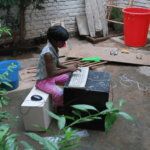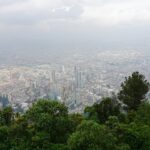Posts tagged with 'Mexico'
The built environment accounts for over one-third of global emissions. In rapidly developing markets like India and Mexico, a surge in housing construction faces a pivotal choice: lock in high-carbon infrastructure or, with the right interventions, enable resilient, low-carbon designs and ...

This op-ed was originally published by Context, the media platform of the Thomson Reuters Foundation, on June 16, 2025. Read the original piece here. A new study has found that 4 billion people – half of the world’s population – endured ...

Sprawl is a known and widespread challenge for rapidly growing cities across the world. Unplanned, inefficient development encroaches on natural resources and ecosystems, often reaching far beyond established transit networks. Residents of sprawling urban areas often face socioeconomic vulnerabilities and ...

Moving around cities in a variety of ways is getting easier and more convenient: whether it’s improved public transportation systems, wider sidewalks or more dedicated bike lanes. With the rise of smartphone technology and GPS, shared mobility services — like ...

The built environment is not on track globally to achieve its sectoral climate targets. Accounting for over a third of total energy system emissions already, the continued use of carbon-intensive materials paired with inefficient energy use throughout the built environment ...

On July 22, the world experienced its hottest day in recorded history. The global average temperature reached 17.2 degrees C (62.9 degrees F), prompting UN Secretary-General António Guterres to issue a global call to action on extreme heat. The problem of extreme ...

The International Day of Play (IDOP), held annually on June 11th, is a unifying global moment to celebrate the power of play for all children everywhere. IDOP draws attention to Article 31 of the UN Convention on the Rights of ...

Bogotá, Colombia is in the throes of a water crisis. After several months of dry weather caused by El Niño, the Chingaza reservoir system, which provides 70% of Bogotá’s water, reached its lowest level in history. The city’s over 8 million residents are ...

In March 2024, the inaugural Buildings and Climate Global Forum convened more than 1,000 participants to spur action towards built environment decarbonization and resilience. The first-of-its-kind forum was welcome, as the sector needs a shakeup. The big issue on the table was ...

Mexico became the first nation to declare access to safe mobility a human right in 2020 and two years later passed the General Law of Mobility and Road Safety to protect people, reduce collisions and promote sustainable modes of travel. Now, with this new ...

For a woman living in an African city, public transport can be a daunting experience. Women usually plan their trips in advance, and consider a multitude of factors before setting out: What is the safest way to reach the bus ...

Last year shattered global heat records. The world witnessed the effects of rising temperatures in the form of devastating wildfires, severe flooding, extreme heatwaves and more. Poor countries and communities who have contributed the least to causing the climate crisis ...

In Bogotá, Colombia, over 3,000 people die prematurely each year due to exposure to air pollution—namely from PM2.5, a fine particulate matter produced by vehicle exhaust, burning and industrial outputs. Bogotá is not alone: According to 2021 data, of 174 ...

With over half of the world’s population living in cities, urban spaces not only house us but offer opportunities for collective work and learning while serving as sources of creativity, inspiration and hope. Nevertheless, cities also account for a staggering ...

Public transport is one of the best, most cost-effective solutions available to address today’s climate and development challenges. Buses and trains can reduce greenhouse gas (GHG) emissions by up to two-thirds per passenger, per kilometer compared to private vehicles. The UN’s latest ...

Page 1 of 10123...10...Last »

























